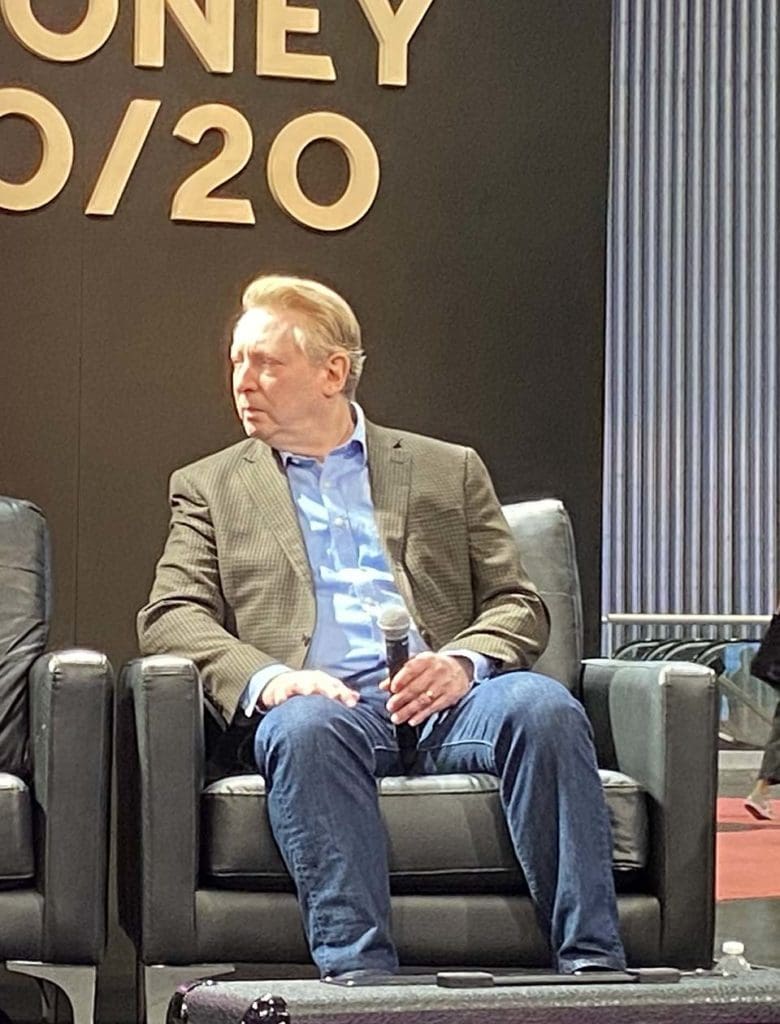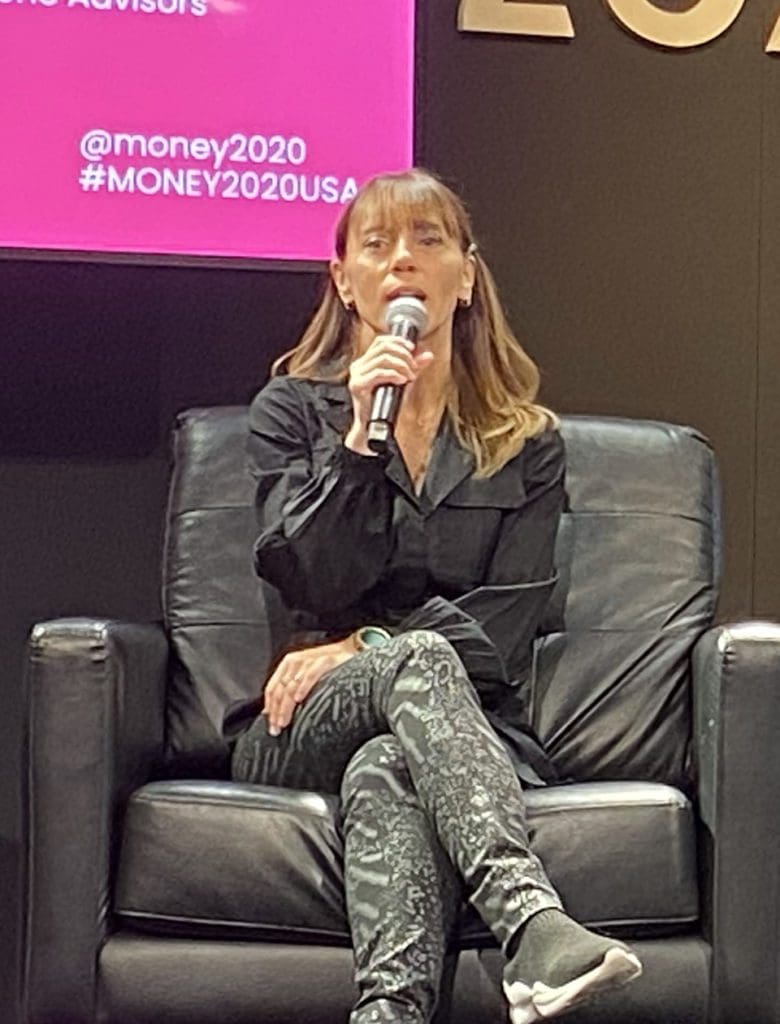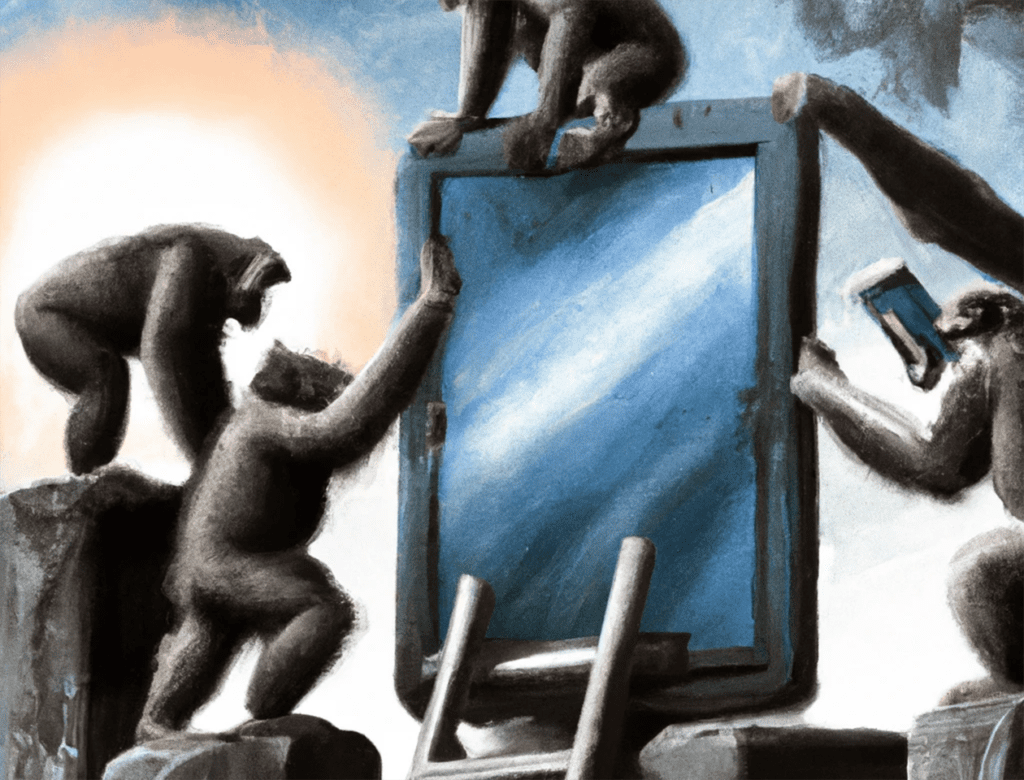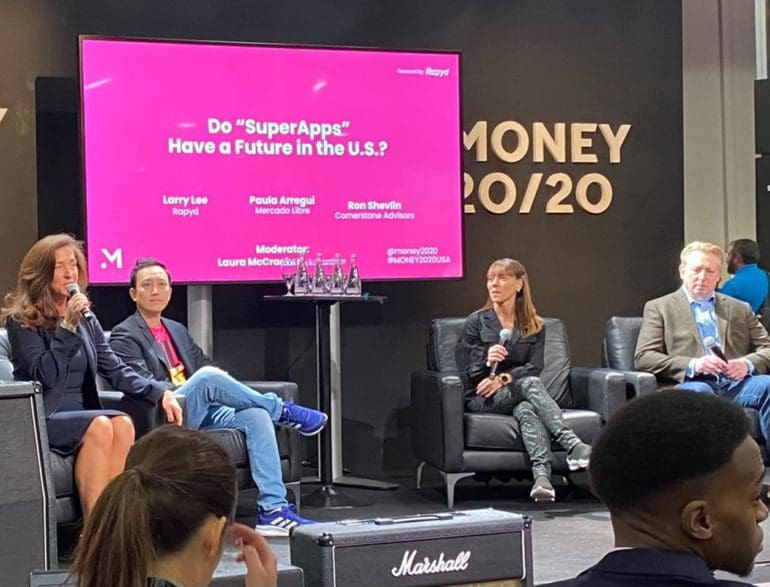LAS VEGAS, Nev. — During the last fintech bull run, no phrase was thrown around with more weight or treated with as much caution as “super app.”
Known in Chinese tech markets as an entire lifestyle all under one icon, super apps like Alipay and WeChat offer everything from rideshare and grocery shopping to complex consumer financial products.
The question has since been: can a super app develop in America? Four fintech experts sat down at the standing-room-only Build Bold stage at Money 20/20 to find out.
They examined super apps like biologists examining a type of mycelial fungus, describing its conditions for growth as a species and what environmental niche it evolved to fill.
A show of hands, who here believes in monopoly?
Moderator Laura McCracken, MD of eCommerce & Payments at Accenture, began the talk with a show of hands from the crowd, asking how many people think a super app will emerge in the U.S. About half of the hands went up, and only a few did not believe the U.S. market could carry it.
One of those naysayers was Ron Shevlin, the Chief Research Officer of Cornerstone Advisors. He said super apps work in Asia and could grow in markets like Latin America, but the U.S. does not have the conditions to support the creature’s way of life.

“It’s important to recognize a super app is not simply financial services on top; it has to incorporate a lot of other things like messaging, commerce, but also services like transportation, telco healthcare, a wide range of things,” Shevlin said. “A super app is not just a financial services company.”
The way he saw it, and the other commenters agreed, super apps rose in popularity in Asia because of a hardware problem: consumers’ phones were too underpowered or short on space to run multiple apps, and they needed everything under one hood.
“If you look at the super apps that have become popular in Asia, there’s a second aspect to this, which is a technological aspect,” Shevlin said. “Super apps are made up of many of the apps together because they have underpowered smartphones in Asia.”
How to build a super app
Larry Lee, Global Head of Financial Networks Rapyd, said he agreed based on his experience building a white-labeled payment operating system for tech and nontech companies across 100 plus countries in Asia and abroad.
He said customers would not have the space on their phones, so they had to choose one experience over another.
The other important building block was frequency. Lee said users open super apps multiple times a day. WeChat even built a spare toilet paper finder tool because so many customers use the app, and there is a good chance someone can spare a square in the same restroom.
“It has to be used daily; you can’t create something that’s once a month and make it a super app,” Lee said. “And that’s why we think ride-hailing has been very successful; it’s part of the world to become a super app. The other thing that stitches together a super app is payment infrastructure. It’s all about commerce.”
Whether ride-hailing, transport, or food delivery comes down to payments and frequency, Lee said, and embedded elements go on top.
Frequency is currency
Maria Paula Arregui, COO at MercadoPago, a self-described Argentinian super app, spoke of her experience building an e-commerce firm that grew to the highest market cap of any company in the region. MercadoLibre is the commerce brand, with MercadoPago as a payments subsidiary that creates 45% of the firm’s value, or $2.6 Billion.
Arregui said payments bring precision and frequency to a brand, users come to look at their funds and transact every day at the least, and they turned that traffic into data and services.

“Why payments? Because payments bring that precision, retention, frequency, and the usage of the users daily,” Arregui said. “Other services are built on top of the data and information that will come from these mass of users you create.”
She said a major aspect of super apps not previously mentioned is the social aspect of trust and privacy. Users flock to social media in the U.S., but Arregui said they do not trust media companies with their data or privacy.
“I believe that trust data privacy, and security, it will be a big chance a social network will become a super app, but I’m not seeing that yet in social media,” she said.
Shevlin said the idea of setting out to build a super app from the ground up is a bad idea.
“If you’re thinking that you’re going to start a super app from scratch, you need your head examined, big time,” he said.
The only players in the U.S. close to something like it are the tech giants Amazon, Apple, and Google, for their existing platforms.
Shevlin said that Americans are opposed to consolidation from a cultural perspective “because Americans want choice and do not want to be dictated what they have to choose from.”
If anyone can, Musk can
Lee said if anyone can build a super app from scratch, it is Elon Musk.
Musk recently completed the purchase of Twitter and is looking for ways to monetize the app, Lee said. But outside of Twitter, Musk has ownership over multiple brands that, if blended, could form an all-in-one experience.
Lee said that Tesla develops driverless, ride-hailing cars, Twitter socializes e-commerce and payments, and it could happen all under one roof. He pointed to X.com, an old domain Musk held on to from his .com bubble days at PayPal, that he said looks suspiciously like a site under construction.
“Has anybody seen x.com? If you haven’t, you should go check it out. It only says X on the website. Elon Musk is the kind of leader that is programmatically insane; he could do something like that from scratch,” Lee said. “You can imagine him doing ride-hailing with autonomous driving cars. They work on that already, you’re putting that on your app. And then you’ll have food delivered before you go to SpaceX to go to the moon. That could be a super app.”
Shevlin said that Musk is too polarizing and Twitter is too political for users to want to transact there.
Regulatory and polarizing policy
Arregui said that a significant difference between LatAm, the U.S., and Asia come from regulators and policy. In LatAm, regulators have been pushing for more innovation, with some fantastic results, but the same cannot be said for regulators or lawmakers in the U.S.
“Both in Asia and Latin America, there’s a necessity to bring financial inclusion; regulators were pushing new companies that brought more people, included more in the financial system,” Arregui said. “If you look at regulation in Latin America, it’s similar to where Asia started.
The creation of interoperability, the creation of alternative ways that could bring people to operate with credit and debit cards, but also with balances e-wallets and banks. That also made a huge difference that allowed us to build, create, and grow faster than we are seeing today in the U.S.”
With his U.S. point of view, Shevlin said the regulators are not encouraging anything fast in the U.S. If anything, regulators are forcing companies to slow down and watch out. Because of this environment, it will be hard for a super app to take off, he said.
Related:
“Apple hadn’t even launched its Buy Now Pay Later service, and the CFPB was already criticizing it for privacy violation: they hadn’t even launched the product yet,” Shevlin said. “You can be sure that in a regulatory perspective, they’re going to be activist in terms of privacy, or no privacy, anti-data aggregation, anti-data utilization, anti-profit type approach to any kind of super app. Anti-trust, just that one card they get to play with; there are too many cards for that.”
He agreed with Arregui that privacy was too big of a concern in the U.S., and trust in data security or privacy is not up to par.
Predictions
Arregui said her best bet for a super app in the U.S. was Amazon but said they are far behind in financial services.
Shevlin predicted that there would be no “Super App” Panel at Money 20/20 in 2025, and if there were, everybody would invite him out just to tell him how wrong he was. He pegged Klarna, for its huge user base and financial services, or Walmart, for its massive reach in the U.S. consumer base as front runners for U.S. super apps.
Lee said super apps wouldn’t be a subject because apps and cell phones are losing their priority in general, but everyone should keep an eye out for X.com.




